Clubbing On TV: An Interview With The Founder of Clubavision
Russ Cleaver tells me all about the origins of his legendary show
Here we are again! The last few weeks have been a juggling act between full-time childcare, work and various other responsibilities, so I’ve had to steady myself and chip away at the newsletter where possible. I wanted to get this one out sooner, but I was pushing myself a bit too much and thought it was best to take my time, ensuring 1) my health was prioritised and 2) that it wasn’t rushed. I want this to be the best quality possible, so taking my time (despite my impatience) is the only way to maintain my high standards.
This edition features a long-form interview with the founder of Clubavision, Russ Cleaver. I reached out to Russ when I was working on this piece a little while ago and he agreed to have a chat with me. Now based in Thailand, Russ manages the Clubavision YouTube and social media pages, keeping its legacy well and truly alive. His entrepreunerial history is fascinating, I love the fact that he just went for it and made things happen with each new project he created. This was a coup for my teen self as well, getting time with the person behind a show that was so influential in my adolescent years.
Also, check out these additional pages:
My monthly techno reviews, with a mix, too (below).
A whole bunch of extras, including another interview - with Mischa Haller, the photographer behind a brilliant book called Not Going Home, the Muzik Magazine archive, a shout out to the new DJ Heartstring release and a big RIP section. Wow, a lot of legends have passed in the last few weeks. Very sad.
Take your time, immerse yourself in the newsletter, share, like or and let me know you’re reading where you see fit. Thanks!
Clubavision Founder Russ Cleaver Tells Me All About His Legendary Show
So, your bio mentions that one of your first steps came through the Flying Squad, can you tell me about that?
Around late ‘89 into very early ‘90, a guy called Steve Dempsey at Vinyl Mania gave me the idea. There was one guy already doing localised flyer distribution - Ray Spence, one of the big dogs in the Raindance team, his brother Bob was doing it, but just for Raindance flyers and a few other little pieces up north. So Steve said, “Why don't you have a chat and you can do something with him?” I thought, “Maybe I could set up on my own across London”. I was already doing a bit of running around for Black & White, Alan Warman and Tommy Mack, so I started to do their flyers, and I did Steve Dempsey's at cost. He was doing 321 Club in Broadway Boulevard back in those days. Just from being out and about, I met different people, like Paul Nelson from Raindance, and many others. So I started getting their work and it snowballed and snowballed, until it expanded into a team, which I called The Flying Squad after one of my favourite series The Sweeney. It just made sense, to me anyway. My brother came up with the logo actually.
One Friday night we were outside on the steps of Camden Palace, and it closed at 2.30am back in those days. This is before City Club licenses went later, I had about 40, 50 people outside giving flyers out. I thought, “There’s got to be a better way to do this:. That's when the idea came to me - “Why don't we put the flyers in an A4 sized transparent bag and charge the promoters less per club for non exclusive rather than single exclusive distribution?” When you go to a shop, you buy a lot of stuff, what do you do? You put it in a bag, you don’t juggle all your purchases down the street. So that's when I came up with the Beat Bag idea, they were super successful and I utilised them for some time.
As the house movement started to evolve, there were more and more club nights in the West End and beyond. I continued offering the promoters the non exclusive A4 Beat Bags as they were cost effective for them, but the house clubbers didn’t take to them, not like the crowd did at raves. At first I couldn’t understand it, and as the scene grew, I was getting more customers because no one was doing mass flyer distribution apart from me. I came up with the idea of the Get Smart Pack, which was a smaller A5 transparent bag. So we did that, same as the A4 one, with a sticker on the front. We got a better response, but it was still missing something. I approached a printer, named Kevin, who did some of my promo materials in Brick Lane, and I asked him if he had any off cuts. He used to do so many clubs, but also a lot of corporate work. He said, “Yeah, I reckon I could do it. How many do you want?” I said, “About 5,000 - 10,000 covers to start with”. Kevin delivered all these lime green and bright pink A4 folded to A5 cards. Just with “Flying Squad, Get Smart” on them… They weren't bad colors for the early hours! We had a bit of fun on the back with some celebrity quotes on the back. The response was extraordinary, and interest skyrocketed - just from receiving a bag where they couldn't see what was inside, it seemed.
From there, only after a few weeks or so, Chris George approached me. He was the big boss of First Continental. The company owned all the Hollywoods and Club UK, too. He said, “I'll sponsor the insert for the packs”. This space he utilised for his club nights, he got the premium space in the packs and I saved on the cost of the inserts, which in turn benefited me with more profit. At clubs that closed late, we could place the waterproof Get Smart packs on car windscreens. We’d put them on cars at places like Bagleys, The Cross (Goods Way), Colosseum (Nine Elms), Linford Studios (Battersea), not forgetting MOS and Leisure Lounge. That's how I found a lot of my staff in the beginning. I was doing it on my own to start with. I’d bump into people giving out single flyers and ask them if they wanted a job. I took on a manager to help with expansion. We attracted more and more people, mostly students, so it was quite transient, but some loved the job so much that they stayed with me for years. Having basically everyone’s flyers in the Get Smart packs got a lot of corporate awareness. Record companies realised that these packs were being distributed straight into the hands of their target market, the people they wanted to make aware of their new releases. Plus it was so cost effective for them. A lot of them advertised with us, Warner Bros, Sony, all the big ones, plus the smaller independents, at the time - we did a lot of XL and Positiva promos.
Companies like Chupa Chups were a good customer of ours, as well. We’d put the small lollies in the bags, also free condoms was another winner - anything went, as long as it fitted in the pack. Now the packs were not only informative but good value for the clubbers as well. Everyone wanted the bag. I started to sell advertising space on the bag itself, but just a strip. Companies wanted the whole thing, but I just sold a 2-inch wide strip as I needed the clubbers to see it was one of my packs. The first strip I sold went to Ministry for a Clubbers Guide campaign, the Drugs Awareness Campaign took that space for a long time also. The whole Get Smart concept was very, very successful to the point that quite a few monthly publications did a piece on myself, the FS and the GSPs, The Face, Touch Magazine, DJ magazine, Club On, The Big Issue, many more, even a whole page in The Independent, plus we got included in The Street Style Exhibition at the V&A museum, the pink frame and its contents can be seen on studio wall in the first series of Clubavision.
At some point, I got itchy feet, and started thinking, “What could I do next?”. I came up with the idea of doing a Clubzone on Teletext. A lot of people today won't even know what Teletext is! It was the go-to place for holidays and things like that. [A very basic, 8-bit computer generated text advertising and information service on the television]. That's where you looked, right? So I went to ITV Teletext in Fulham and made a deal with them. It was super expensive, I remember feeling really sick on the morning of the meeting. I had to go to sign the service off because you had to book a minimum of 12 or 14 pages. It was then up to you whether you filled them or not, but you had to book and pay in advance for that base amount. I forget the exact number, but it was a few grand on a monthly basis, up front.
I guess it was worth the upfront investment?
Oh yeah, for sure. Around that time UKG was just coming to the forefront. We had more of that genre than house music. Cream Of Da Crop was one, Twice As Nice, loads of different ones, but some house ones as well. I had a staff member called Sarah, who ended up being my PA. For better or worse, she was tasked with Teletext, landing page number 363, which was easy to tap into the remote, they gave her a special computer to actually input each page and make them live, and she did a great job. She had previously worked for Mensa at Interdance and Linford Studios, as well, so she had a clubbing background. To input text it wasn't just a question of scanning the flyer. It was all pixel blocks, like Lego. She had to sit down with some people for hours, telling them, “You can't have that, you can’t have this”. Nothing on there would ever really look like the flyer. But people knew what Teletext was, it was a popular medium for people to get their information back then, at one point they did a research poll on it, and it had 78,000 viewers per week!
By the way, before this, I started a club line. Remember those 0898 numbers that came on late-night ITV? I started one of those. Again, it was money upfront. One of the girls that worked for me, Stacey, had a bit of a husky voice, so I used to get her to come into the office an hour early on Thursdays before she went out with the flyers. I used to write everything out and we’d record her reading it all.
So people would phone the 0898 number and it would be a recording of Stacey telling them about what was happening that weekend?
Yeah exactly. This would be about ‘93. It didn't last long. I promoted the service guerrilla marketing stylee, I printed flyers with the number on and my teams would give them out with all the other ones. But we tried and tried, and it didn't kick in. And that's when I came up with the Clubzone on Teletext 363 thing. That service worked big time for a while, but, again, I wanted to move on to something else after a couple of years, maybe even less than that. I thought maybe I could do a magazine, but when I looked into the magazine market, I thought, “Well, I'm never going to compete with the big boys”. There was DJ Mag, Mixmag, plus Ministry and Muzik. Anyway, in the end I thought, “Why not do a clubbing magazine on video, I can't see anyone doing that”. I think Clubavision was the first and only name that popped in my head. It represented exactly what it was all about.
You didn't have any background in film at all, did you?
That's been my life all the way through - If I don't know, I'll just wing it and learn.
I think, especially at that moment in time, in dance music, there was a lot more opportunity for people to just wing it, as you said, and find their way and make things happen in quite a DIY manner. Whereas now, and I'm not being critical at all, but because it's more of an established industry, there's more of a business element and structure to it. I don't know if what you, and many others, did is as feasible for people that are up and coming now. I think there's still a DIY element, but you simply have to be a lot more business and marketing savvy and everything, because you're going into a competitive market where a lot of people are across that kind of thing. You mentioned guerrilla marketing and I think that's a very, very accurate way to sum it up - especially what you were doing with the flyers. I was really impressed that you didn't come from that background, yet you still made it happen.
With Clubzone on Teletext 363… I've got no idea how I did it, I can't remember - I think it was just perseverance, but I got Stella Artois, or the agency that represented Stella, to sponsor the Clubzone. As I said, we had 78,000 viewers on that and it was growing all the time. We already knew it was doing well from feedback we were getting at ground level. I did a campaign on Kiss 100 FM as well, read outs and short ads. It was a contra deal with them, if I remember rightly. They had a page for the station on 363, and maybe another one for an event. In return for that, they would give me X amount of readouts and adverts in certain shows. I’d been running the Kiss schedule on the back of the Get Smart packs, so I already had that relationship with them. Everyone was working hard back then, and a lot of it was just falling into place, you got to know everyone real quick. The scene was good for networking, if you want to call it that.
How did it grow from there?
Well, this brings us to the infamous Ibiza trip... I went through a third-party holiday booker, Sue Bennison who dealt with all the club people, who I knew from a friend of mine, Alan Warman, and we (Wendy, Bongo, Sonia etc) ended up in a shared villa. It was a massive place, two storeys, and we were in the annex. So there was my little crew, and the Love to be… people, from Leeds. I got to know them, told them about what I was doing and Mark Black, one of the promoters, told me that the marketing agency's brand manager for Grolsch, Ginny Till, was coming out on whatever day it was. I can’t remember the exact day, but that was the day we were going to leave. She was staying next door, basically. I thought, “I can't miss this”, so I said to my crew, “Listen, we're supposed to leave around about that time to get the flight back, you go without me. I've got to wait for this. I've just got to wait for it, because I'm never going to see someone up that high again, maybe.” It was coming up to the time we had to leave, the taxis were on their way and then Mark came in, and he’s like, “She's just checking in. She wants to see you”. I said to my friends, “Okay, you can go”. But they were like, “No, no, we're all gonna wait”. Ginny came in and I blurted out my professional life story in about a minute! “This is what I want to do. Do you think Grolsch would be up for it?” She goes, “Yeah, I think they would”. She took my details, but I made sure I got hers, too.
After I got back, I think a week or so passed, and I was thinking, “She hasn't called, maybe I'll call her”. And then, bang, she called me and invited me for a meeting at Bass Brewers HQ in St. Martin’s Lane, opposite Stingfellows. She said, “The brand manager’s here as well so you’ll have to fill him in with what you’ve told me previously, and maybe expand on it a little bit”. So, I go down there, I've got a handful of my Clubzone 363 flyers and I've got some Get Smart packs and that was about it. Clubzone was already up and running but I couldn’t take a TV with me. To cut a long story short, I did a stand up presentation and showed them all the materials. Luckily, we were in a boardroom, so there was a TV in there, and I managed to get Teletext on it. Review the channel, like the channel, and they took it on. So I had them sponsoring the Get Smart packs, and Clubzone 363, what an awesome start to a business relationship. From there, I moved forward to the idea of the video magazine. I called Ginny up, told her about the video magazine idea and asked if she thought Grolsch would be up for sponsoring it. Bear in mind, as I said to you before, I’d never produced any video or TV before in my life. I just had the idea in my head and the determination that I could do it and I hadn’t filmed anything yet. They went for it, and we agreed that I’d do six episodes to start with.
I'd already spoken to a few contacts just to see if I could get anyone to actually film it, and obviously you need a presenter. Lisa Nash had been working in my office for three years before, maybe four. She was the girl that answered the phones and did the invoices for everyone, Flying Squad and Clubzone. I told her, “I'm sure I'm going to do this. I'm looking into it now. I think I will need a presenter”. Lisa hadn’t really done any presenting before. She'd been to college and stuff like that, but she had the look and she was a clubber and had a good voice as well for it. So we both thought, “Why not?”.
Where was the video being sold?
Virgin Megastore. That was another thing… After the meeting with Bass in St. Martin’s Lane, in a matter of days I managed to get a meeting with a guy called Mark. I can’t remember his surname but he represented Virgin Megastore and they had an office around the back of Chiswick roundabout. We went down there - I took my PA with me - and, yeah, just like, “We’re doing this video, blah blah blah, can you stock it in Virgin Megastore?” To my surprise, he went, “Yeah, okay, SOR”. You’re not gonna say no to that. It was perfect for them, no risk and they fill some shelf space and it was great for me, from a marketing point of view. We got that in before we’d even made anything!
The first shoot we did was part of the deal with Grolsch: We would shoot X amount of film at X amount of their sponsored venues. At that time, they were a main player in clubland. They sponsored Colours in Glasgow, Moneypennys, Chuff Chuff, Love to be… I can't remember all of them, but there were a lot. So the first shoot we ever did, we could have done it right in London, close to our offices but we went all the way up to Glasgow. We filmed Colours up there. I managed to feature Pete Tong, Carl Cox, BT, loads of people. I knew a lot of these DJs from the Flying Squad days, so it seemed easy for me to do it. Rather than some TV bod coming in that they wouldn't even know, and maybe didn't trust, they already knew me. Actually, we didn't get Carl Cox on that first night, we made an appointment to meet with him the next morning at his hotel. 11 o'clock in the morning, before we had to go to the airport. I just assumed he was going to be there. Knowing Carl and how professional he is, I didn't think it would be a no show or anything like that. He spoke about the awards he had just won, his hotel room mantlepiece was full of awards! We did Moneypennys and Chuff Chuff a few times, and we also flew over to Amsterdam for a Grolsch Competition. Grolsch had this competition where a certain amount of clubbers from different parts of the country could win a weekend away in Amsterdam. So we filmed that as well, because it was already agreed and in the budget, so to speak. That was a good time. We had the whole weekend there, but only had to film one night and some daytime action, get the winners on film and all that.
Also, I managed to get DJ Mag to do a first, a video cover mount. Amazing right? All I had to do was give them the first episode retail videos. They (Charles and Michael) really sorted me out with that one. As well as being in Virgin Megastore, we had a subscription model set up as well. Sales were okay, the cost of everything was already covered anyway, so any sales were a bonus really.
What was it like for all of you that were involved in Clubavision at that particular point? Doing your first shoot. Was it stressful? Exciting? Did you have quite a strong vision of what you wanted to get out of the situation?
Well, because I knew the environment really well, it didn't faze me at all to go into a really loud place with loads of people on various… whatever. I knew, from day one, I wanted to get the biggest DJ names that were in the building. For me, when I was scheduling episodes, it was dependent on four things: 1) where it was in the country, 2) what music genre it was, 3) what DJs were playing and 4) the size of the venue. So the first shoot, it was such a long time ago, but I was most probably excited about it. The camera guy and the sound guy came from a production company. They were just saying, “Do this, do that. Does that sound alright?” I picked it up super fast. And Lisa was great as well. We practiced in the office on numerous occasions, and she'd interview me, or she'd interview some of the Flying Squad staff.
Did she have any kind of script or anything, or was it mostly done on the fly?
For the first videos, I picked the clubs etc, Lisa would come up with fashion segments. For link scripting I did most of it, but Lisa wanted to have her input because she was the one actually doing the speaking. It's easier for someone if they're going to actually speak the lines to write them as well. we’d go through it of course. but I suppose you can call it a collaboration. In the early days she was researching in between still doing invoices. With the video series, the first three episodes featured Matt Lucas. I would tell him what to throw to (i.e. talk about what’s coming up later) and he would make the rest up freestyle and do his little characters. We used to shoot him on a Sunday around the office complex as there was no one around, this was just before Matt became George Dawes on Shooting Stars. I had an idea that he could be the studio anchor. He did a few characters: A hip hop guy, a student and some Toff character, similar to Chumley Warner. It wasn’t that popular though, so I dropped him after the third video. Look at his career now! The show had various other co- presenters with Lisa after him, Jemma and Jules.
These were monthly videos, but I used to come back off a shoot and paper edit all the footage off VHS dubs with timecode straight away, pretty much. I bought two video recorders, good ones that had a jog on them on, then edited on my own in the office and faxed the edit codes to the cutting suite. I did that all the way through, from the video series all the way to the last TV show. I’d fax them over and they’d be passed on to somebody like an intern or runner who could punch the numbers in. Then I would come in, clips already in the Avid offline system, it would save so much time and money but I'd be there all night. Sometimes I’d finish at seven in the morning as I was using downtime in the edit, so a cheaper hourly rate. I really, really enjoyed it. You have to really want to do it, and love what you’re doing, to work for that long. And I did.
I worked really hard at getting the show out there as well. Every Christmas I’d send out customised Christmas cards with photos of the presenters and the Clubavision logo, plus a copy of the videos, to all the main TV stations, ITV, Sky and so on. Just to get the name out there. I also got several pieces of nice PR in various publications: DJ, Touch, Muzik, even a double page spread in The Daily Star written by Rav Singh, this was all while still on video.
We got to the fourth video in Series 2 and that was the big one, that was our first trip out to Ibiza. I planned it well. We went out there when it was the second ever Radio One Weekend. Eddie Gordon, who was a good friend of mine, was the producer. He actually came up with the concept of taking Radio One to Ibiza and he was managing Tongy at the time also. We just landed in the afternoon, checked in the villa, went down to San An and the first person we bumped into was Brandon Block on the beach in between Del Mar and Mambo. Yes there used to be a beach there. Later that night we filmed Clockwork at the awesome Es Paradis. The following night, it was Radio One at Cafe Del Mar. Eddie was a star, he got me everyone. In 60 minutes we basically interviewed everyone in clubland that was on the island. Many thanks to Eddie for that. I always thank him for that.
How did it end up on TV?
That Ibiza episode I just mentioned was the one that got me called up to Granada, Manchester because they were running ITV night time. A lady called Carol Groves called me in. I'd often called the office up in Granada land, many times, “Is Carol there? How can I speak to the right person, blah blah blah”. Of course, when I walked in, she was like, “Now we can put a face to the voice!” They all knew me in the office. I had a short meeting with her, about 15/20 minutes, and she said, “I really like the show. I watched it, every single one that you sent”. So that surprised me. I mean, this is over a two year period. She said, “I want to make a couple of changes to it”, and what am I going to say? “No, you can't”? She suggested putting it out every Friday, with 13 episodes to start with. I said, “How many?!” I thought she’d just say do one as a pilot. So that’s what we did. Funny thing is, one of the execs at LWT really liked the videos, but at the time said the show wouldn't work on the national network, that it was more of a regional thing.
I said, “I'm on the ground. I'm getting the feedback from the promoters, DJs, but more importantly, the kids in the clubs.” I was getting 100% positive feedback from everyone. So I knew it would work. On the train back from Manchester, my phone goes after 10 minutes and it's the exec that said it wouldn't work: “So Carol has just given me the good news. I would like LWT to comply the series”. What the hell was compliance? I didn't know. We agreed I’d go in and see him at The South Bank studios the next day. I did a bit of research before I got there, and, it turned out that, because I was an independent producer, I needed a major TV company behind me to “comply” - in other words, to make sure there's nothing untoward on air, basically. I went to see him the next day, and he expressed an interest in these things - compliance of each show plus adding the LWT logo to the end slate. Bob explained to me exactly what they want to do. I'd have to send everything for them with the Digi Beta broadcast TX tape and safety copy, the compliance paperwork, the sign off sheets and the music cue sheets and everything. ITV took care of the music, because they had a blanket agreement with all the music companies. Lastly, he wanted to be the Exec Producer on the show. I said, “No problem”, as I had kept the copyright to the name and the content, So we were off and running.
That was in January, and we had to start in March. One of the first things I did was a barter deal with some dance music magazines. My plan was to feature a top 10 chart from a magazine in every episode in return for ad space, heard that before yes? But I wanted to do the charts in a way that was fun. So we got the club kids to do it. Everywhere we went, clubbers would queue up to be a part of that. Sometimes we had to do two number twos and four number ones because the people that did it were off their nuts, a little bit too much! Even though they didn't care at the time, I thought they might care later on so I was careful to make sure we didn’t feature anyone that was too mashed. We had DJ Magazine, Ministry, Touch, Seven... As mentioned, I would brand them on the Top 10 on screen, and they would give me a barter deal on ad space for the show. So we were in all the quality clubbing magazines. That's why I started with the marketing stuff. That's one massive reason why our viewers watched live, or taped or watched the show when they got in from a night of clubbing! It wasn't just the fact that we whacked it on ITV and hoped there's going to be loads of people watching. I actually put it out there. Clubavision branding was on about 50,000 Get Smart packs every week around London town It was on Teletext to 78,000 people every week. It was in magazines every week, plus featured editorial. On top of that we did thousands of flyers as well. All of that boosted the viewership. We had a million plus, which was pretty unheard of. You'd never get that now at night time or even daytime.
I really love that you had this visionary way of approaching the things that you did, and you were a big thinker who just went for it. Did you have any failures along the way?
Thanks for saying that, I guess I did have a vision without knowing it was a vision at the time. Every project really was alright. The only thing I fumbled on a little bit was that phone line previously mentioned.
Can you tell me any funny stories or any particularly fond memories from the years that you were doing the videos and the TV shows?
It's hard to pinpoint one! We had five seasons of shows plus the massive Ibiza special night plus the videos and it was all great. I guess one highlight for me was when we turned up to Naughty But Nice in Hereford. The queue was all the way down the road outside the club, because everyone got there pre doors opening. They knew we were coming from all the promo that was done. We parked the crew bus up near enough outside, on the opposite side of the road to the club. We got started unpacking the camera gear and they all started singing the theme tune. I knew people were watching, but when you get that first hand… that was nice. But it's so hard to pinpoint, so many highlights! Recently I've had it a couple of times where people have messaged asking me for shows they appeared in. I had the friends of a girl called Sian, who was at Y2K in Cardiff, saying they really wanted me to put the episode up because she’d passed. They wanted to see her when she was young and vibrant and having a great time. I’ve had that a few times actually. I’ll put a little memorandum note in the description for them. I guess that's going to happen more and more as the years go on as well.
Yeah, I see a lot of people talking about how much the show meant to them. What does it mean to you to be doing all of this now and to be having the positive feedback in the comments and messages you see?
A few years back I thought, “Maybe I can bring it back?”. I sent out a few letters… Let's just say the response was similar to what I used to get the first time around. Then a friend of mine, JG, said, “Why don't you put it on YouTube?” YouTube wasn't like it is now. It's come on leaps and bounds in the last few years. So I put a few VHS quality clips up, I also put a few edits on the Clubavision Facebook page and group, but I hadn't got my master tapes at that time. Didn't really do a lot with it, and the quality was crap. Luckily, some friends of mine were kindly holding all the master tapes - all 76 episodes, plus the specials before they went to the ITV library. I’ve got to say a big thanks to Glenn, Roy and Dave for that. They really helped me out and all the tapes remained unscathed, a miracle really. Another thing that went my way was, because I made the video series before it went to TV, I held all the rights to the footage. It’s my show. I think I’m the only one, of all the dance music shows that went on to keep full ownership, maybe Pete Waterman for Hitman kept the rights also. Recently I had an archive company approach me and say they wanted to archive the whole thing, so they digitised the lot. Obviously, that’s a very expensive thing to get done if I’d hired someone because it's in real time. But they did it all for me. It took three months. I have access to that library, and now it's all in glorious HD. Amazing. That's when I kickstarted YouTube again, because the content was worth looking at - everything's in clarity. I wanted to do it for my legacy more than anything. None of us are getting any younger, especially me [laughs].
That legacy is the impact it had on me and so many other people.
It's mind blowing, isn't it? When I came up with the video magazine idea and then went to Ginny Till for Grolsch, then Virgin Megastore, then went to Carol Groves, it just snowballed. It was meant to be, you know. There were gaps between shows but the momentum did follow on. I remember Carol saying to me one time at that meeting, she goes, “You persevered, and perseverance works”. I said, “Yeah, I persevered because I wanted it.”
So, the last thing I wanted to cover is your own connection with music and clubbing. We've spoken about what you've done and created and achieved, but in terms of your own entry point and getting connected with music, when did it all begin?
Well, this is gonna age me now but who cares… soul music, late 70s. If you ask any big name DJ from that 80s/90s DJ generation, a lot of them come from that genre.
Yeah, there are a lot of soul boys, eh.
Going to the first Caister Soul Weekender in 79, a groundbreaking event put on by Showstoppers, was mind blowing. Pre weekender we travelled to all dayers in Bournemouth, Purley and Brighton, for years Friday was the Royalty (again Showstoppers) in Southgate with Froggy & Chris Hill. America's in Southall on a Thursday, Goldmine in Canvey Island, Rio in Didcot, Frenchies in Camberley, Lacey Lady in Ilford, Bogarts in Harrow… too many to mention actually. My mates and I didn't want to go to mainstream “Sharon and Traceys” clubs so we had to travel. The music and DJs we loved at the aforementioned clubs were better so you had to travel! But we used to do that, we would travel just to dance to our music, listening and taping the radio on TDK Cassettes, trying to cut out the speech to make your own mixtape for the car. Robbie Vincent for Radio London on Saturday mornings. Greg Edwards on Capital Saturday evening plus all the pirates Invicta, JFM, Solar, Kiss, too. Those stations played the soundtrack of our young lives! That's how I got into it. Actually, I scribed the sleeve notes for 80s Soul Weekender, the story on that says it all actually.
In the eighties it all changed. I was living outside London, then after a difficult situation I wanted to move back. I stayed at my brother’s for a little bit, then I met Alan Warman, just from going out, he offered me a room at his house as he was going to be promoting six nights a week in Ibiza all summer. So I moved in and that was the start of my nightclub/PR/marketing career right there. Once you meet Alan you will never forget him, a strong personality and, he pushed me into getting involved in the scene. So I got involved with the Black & White crew, aka Alan and Tommy Mack, they were massive at the time and were for years to come. At the start I used to do flyers for them, then booking the DJs for Gass and Passion at Broadway Boulevard, 4am - 10am, yes you read that correctly. Sometimes I’d do the door for them at Gass Club on a Friday. It all rolled on from there, going to Vinyl Mania, meeting Steve Dempsey… and we’re back to the start of the interview!
Anyone you’d like to shout out?
I would like to say thanks to Lisa Nash, Janine, Samantha Mann, Sarah Callaghan, Jaimi West, Carol Groves, Bob Massie, Wendy Dove, Rowland C, Ginny Till, The Crew (You know who you are), Alan Warman, Tommy Mack RIP, Steve Dempsey and everybody else that helped in their own little way to create my vision! Thankyou for being a part of this journey.



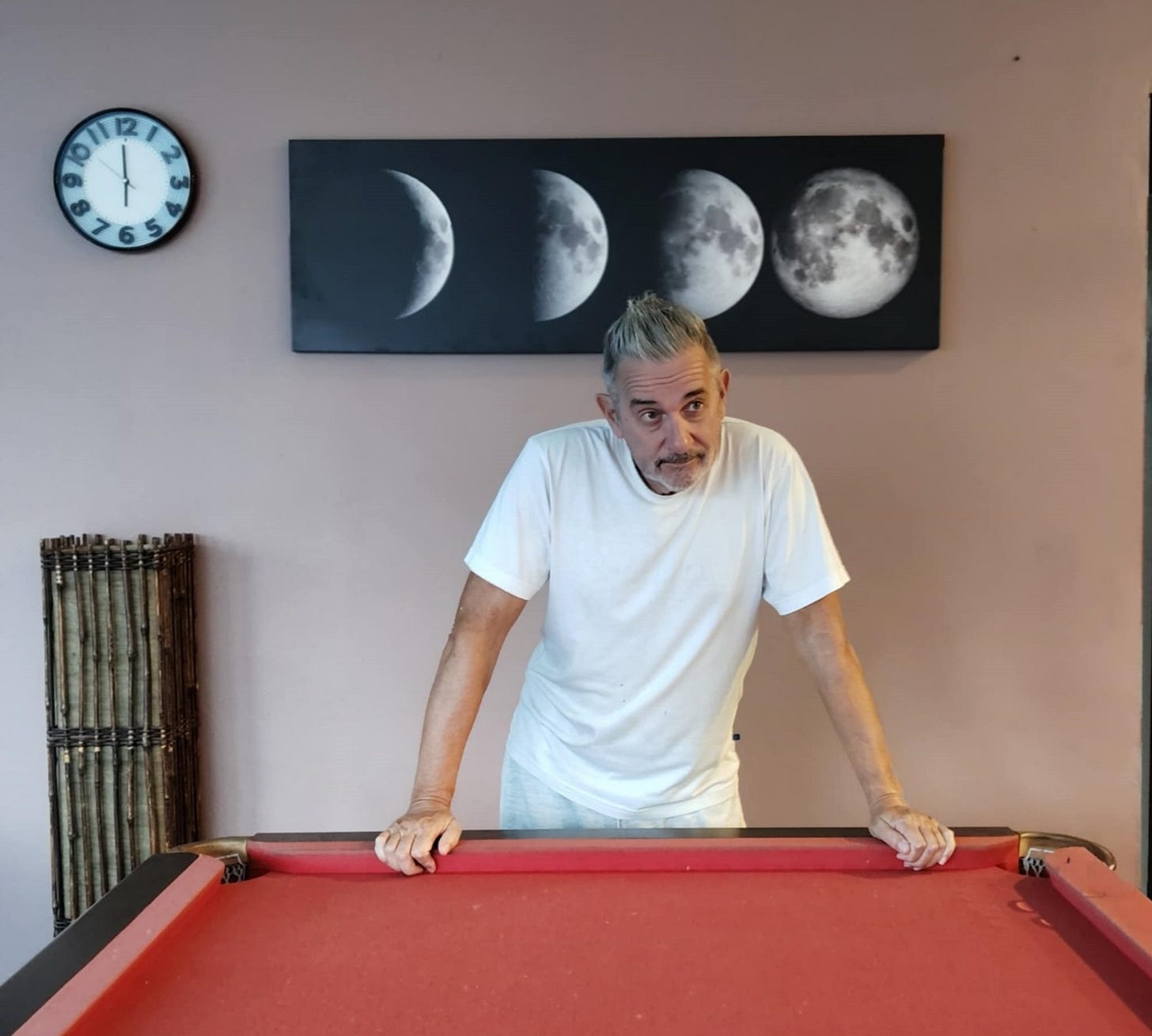
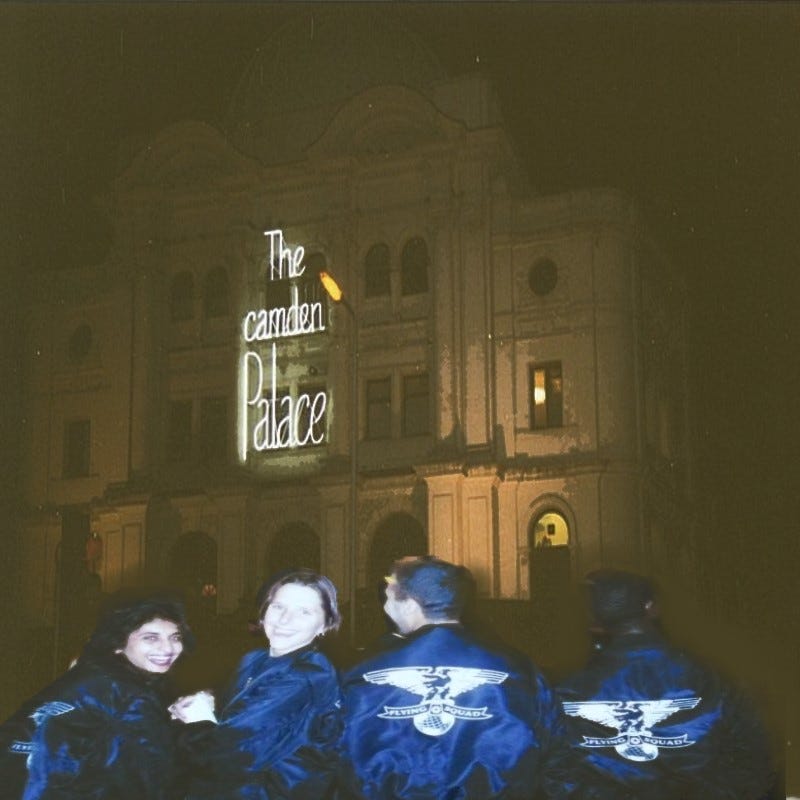
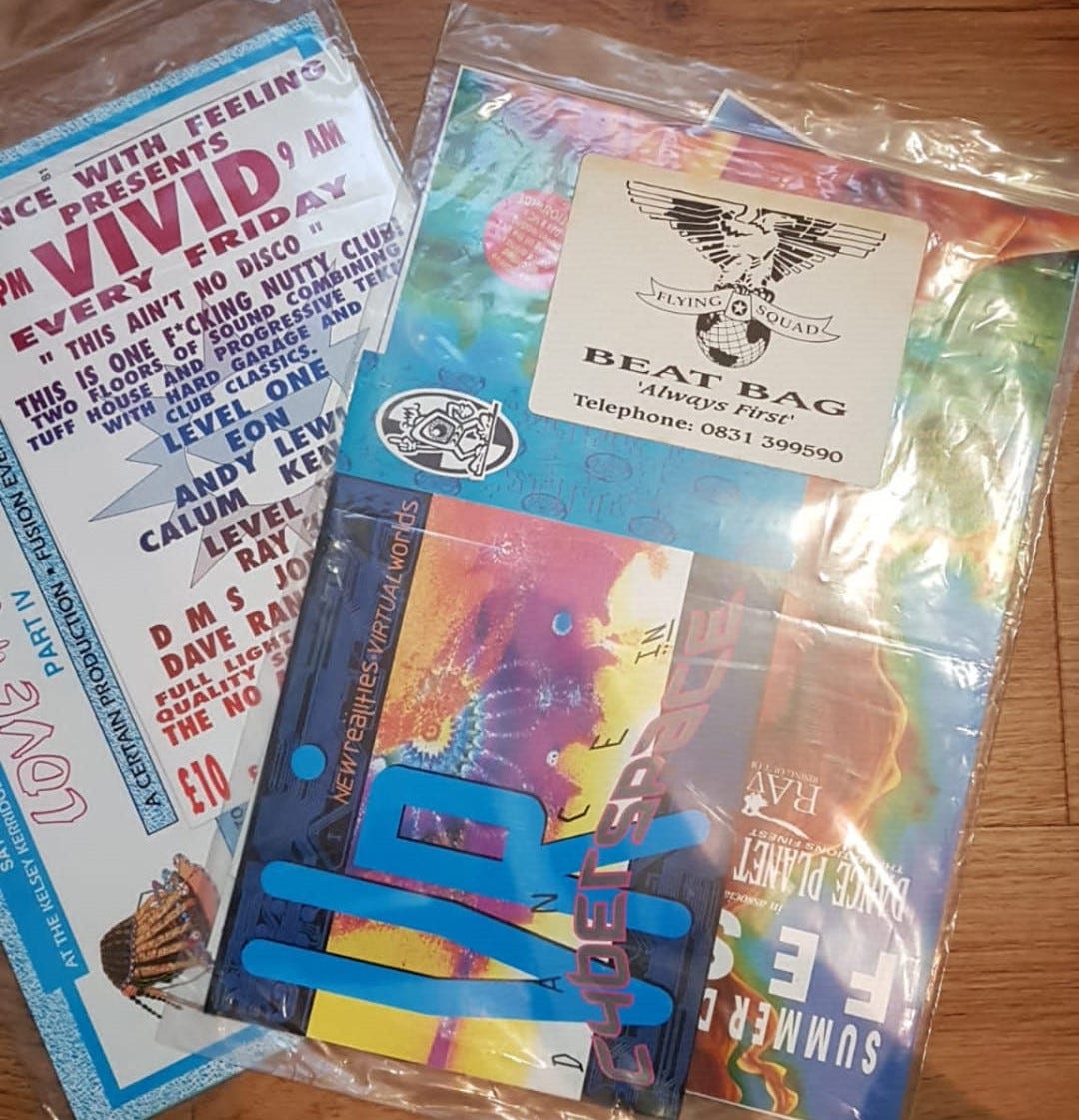

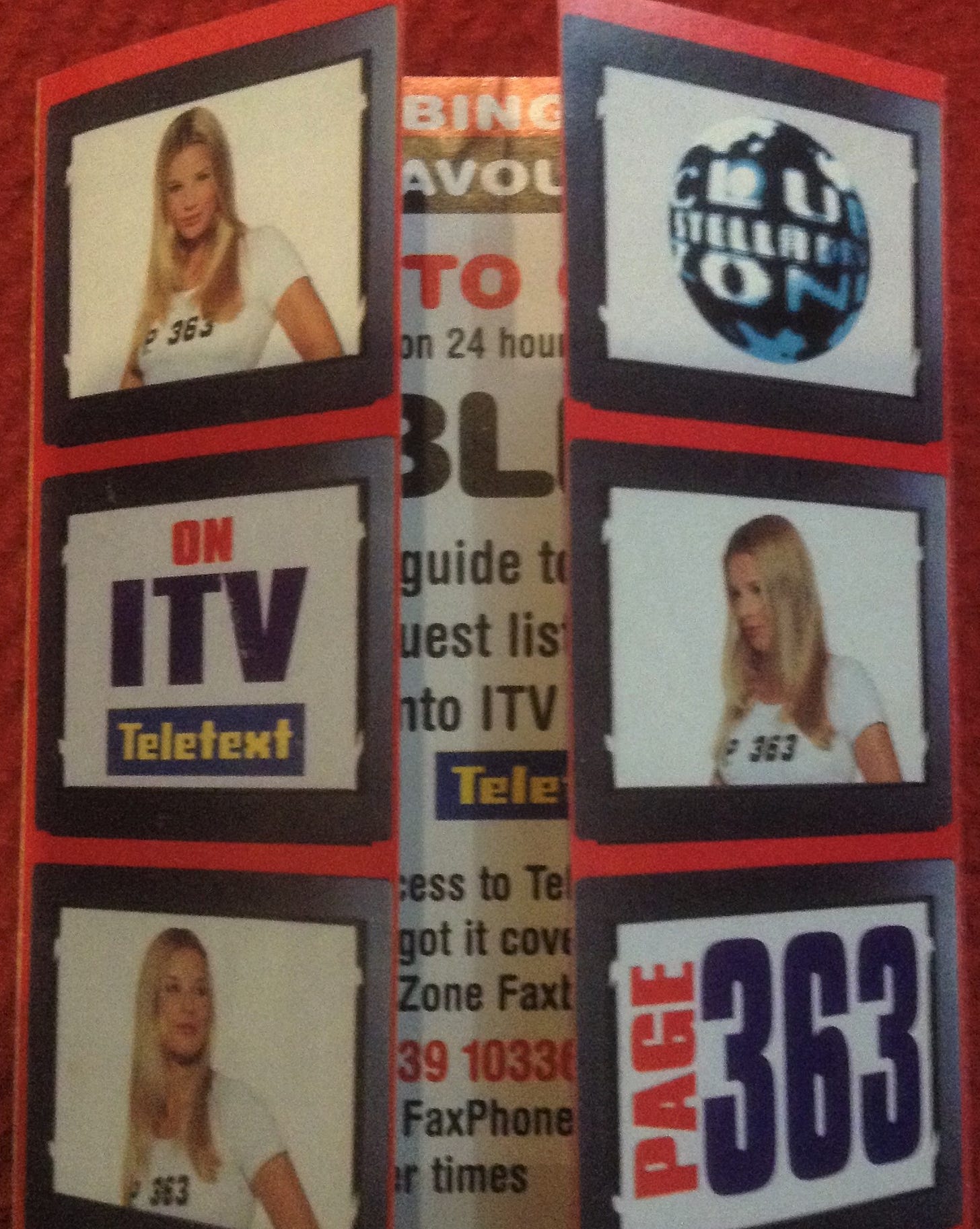
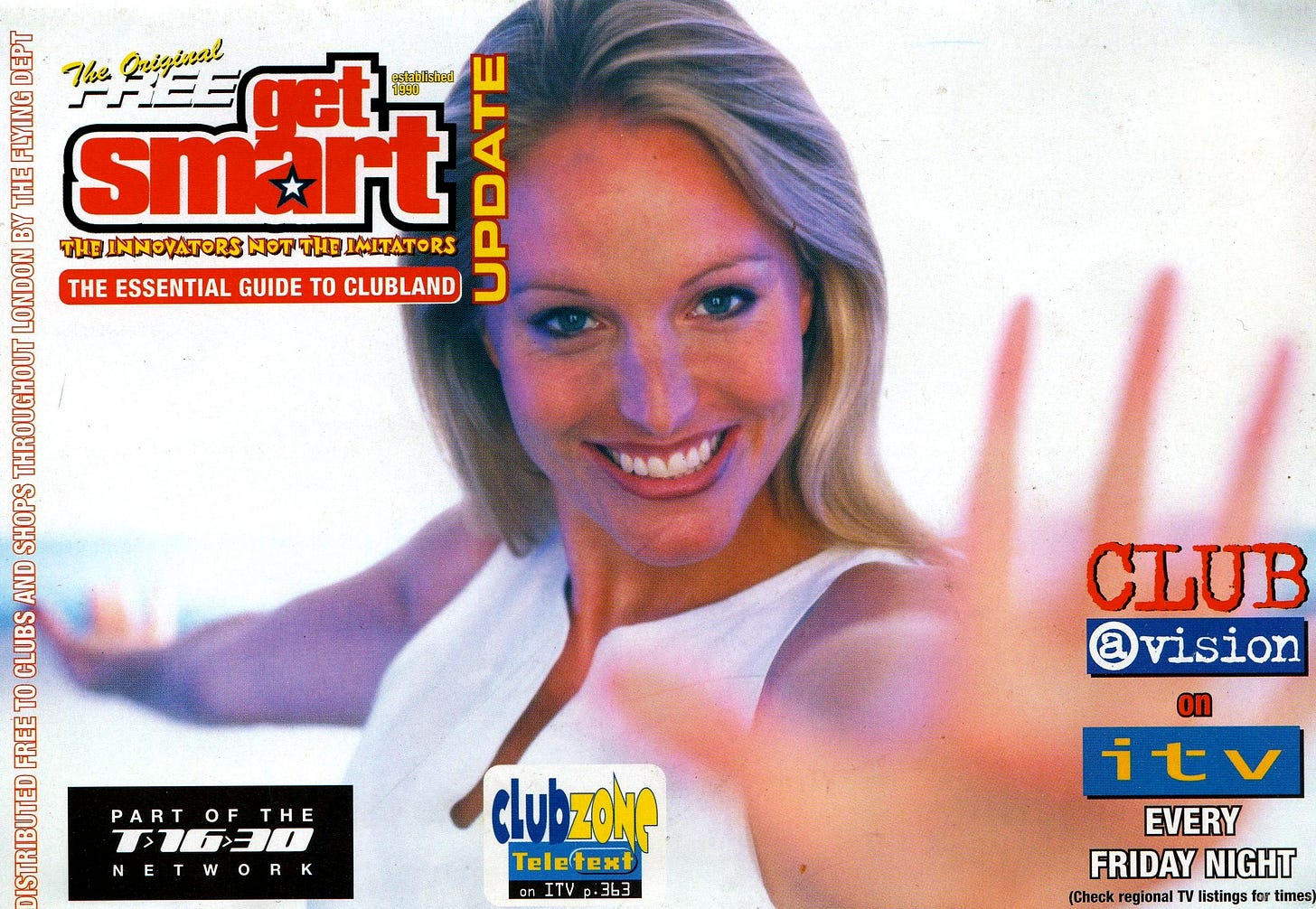
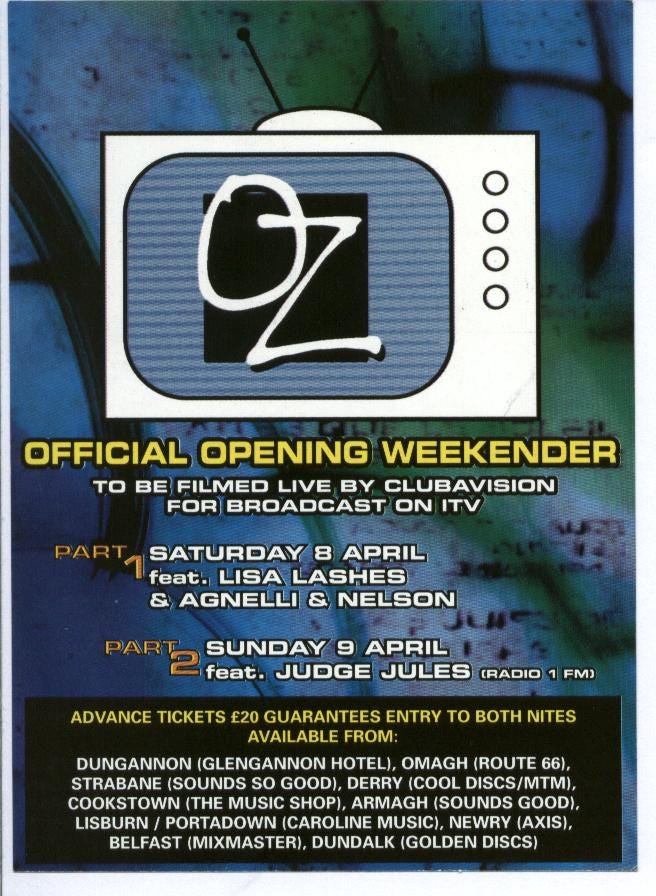
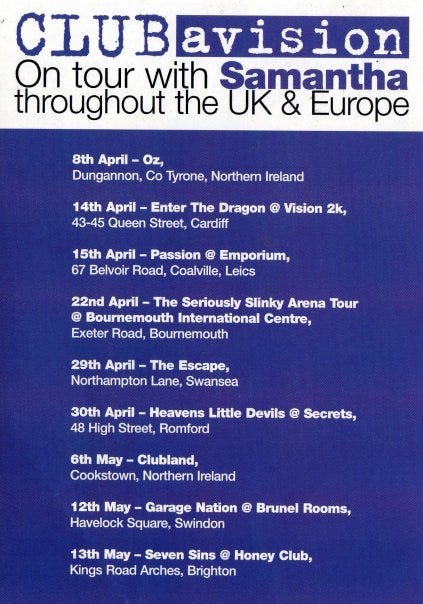

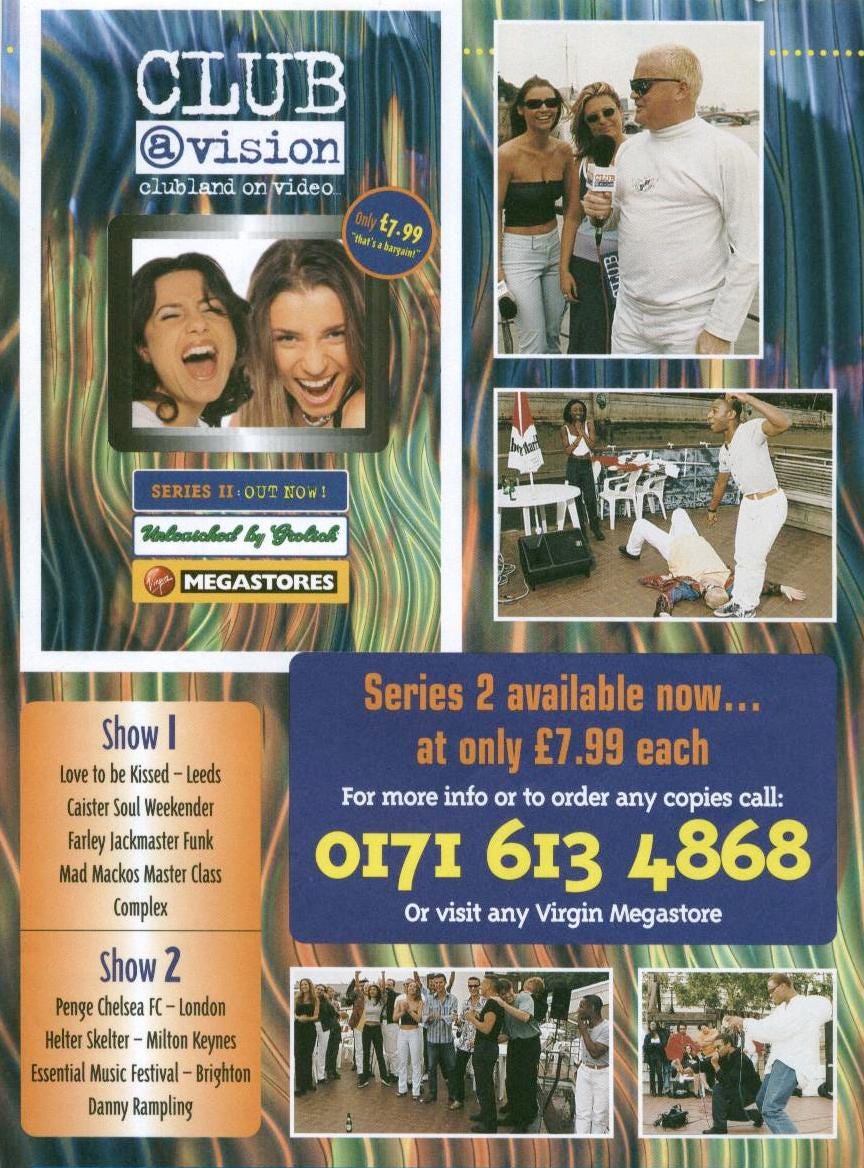
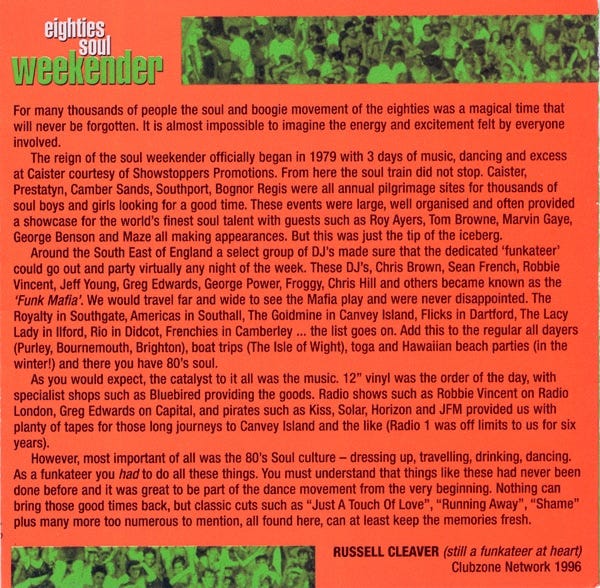
Fascinating read, thanks!
just amazing reading the whole journey the flying packs were so cool in there day,then clubba visio on video and itv on fridays and all on hd now brilliant and your putting it on ytube,i will watching that ..you have some magic stuff on film well done all the effort was worth it..did gas start in 1990 or 1991 i cant remember...bfn